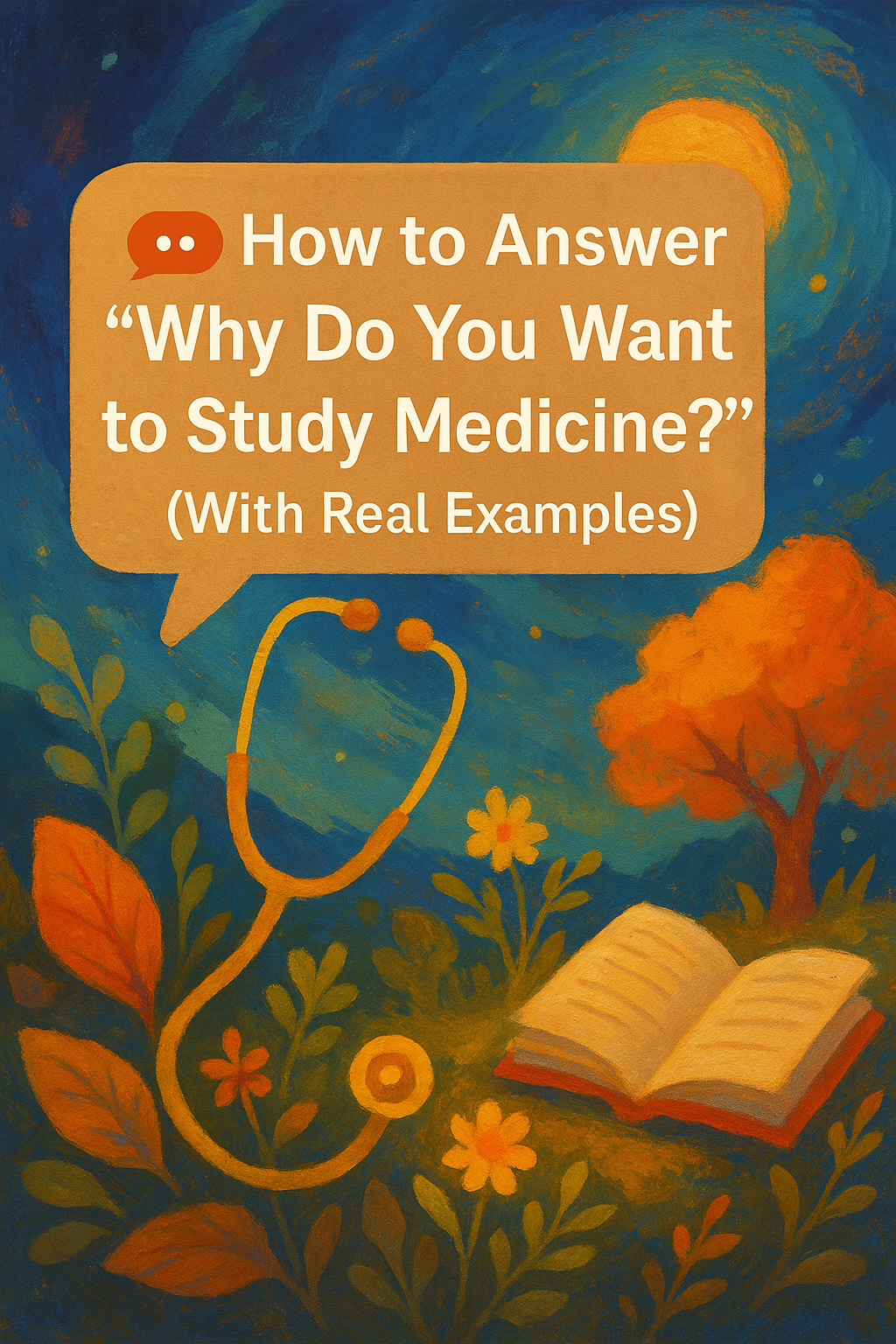It’s often the very first question in a medical school interview — and also the one that sets the tone for everything that follows.
✅ It’s not just about what you say, but how clearly you show your understanding of the medical profession, how well you’ve reflected on your experiences, and whether your answer feels authentic, informed, and personal.
🧭 Structuring Your Answer: The C.A.M.P. Framework
To provide a comprehensive, structured response, I’d encourage you to consider the C.A.M.P. framework:
- C = Clinical motivation
- A = Academic interest
- M = Managerial/leadership aspects - this may include teaching & medical education
- P = Portfolio career / personal drive (e.g. values, long-term fit)

👇 Example: A Strong 3-Part Answer
(1) 🌱 Early Interest in Science + Human Body
From quite a young age, I found myself fascinated by the structure and function of the human body — particularly the way different organ systems coordinate to keep us alive. This academic curiosity gradually became tied to a desire to pursue a career where I could apply science in real-world settings, rather than working in a purely theoretical or laboratory-based role.
What drew me to medicine in particular was the blend: scientific understanding + meaningful human connection. It became clear I wanted a career that was both intellectually challenging and people-facing — where every day was different and involved being part of a wider team.
(2) 🩺 Real Insight from Work Experience & Volunteering
That interest in science led me to seek out experiences that would give me a more realistic insight into medicine.
I spent time volunteering in multiple hospital departments — from a neonatal ward to a palliative care setting. In doing so, I came to appreciate that doctors aren’t just involved in diagnosis and treatment; they support patients and families at every stage of life, often at their most vulnerable. One moment that stood out was in palliative care, where a cancer patient — though no longer curable — was being treated with immense empathy by the consultant.
What struck me wasn’t just the clinical decision-making, but the way that clear, sensitive communication completely changed the atmosphere in the room. It reinforced to me that medicine isn't just about curing illness — it’s about preserving dignity and providing support, even in moments when treatment may not change the outcome.
That’s when I began to realise: this is the kind of impact I’d find fulfilling in the long term.
(3) 🧪 Academic Motivation: Lifelong Learning & Research
The academic side of medicine also appeals to me greatly. One of the things I specifically researched about [Insert University] was their ongoing work into [Insert research project or disease area], and the potential applications that might have for patient outcomes in the future.
Knowing that I could potentially contribute to future developments in healthcare — through intercalated degrees, academic foundation programmes, or even through reflective audit and quality improvement as an FY doctor — is something that motivates me deeply.
Medicine is a career that evolves constantly, and I want to be part of that learning journey throughout my professional life.

🧠 Bonus Tip: Be Prepared for the Follow-Up
You might get asked:
“But couldn’t you do that as a nurse / paramedic / psychologist?”
This is not a trick question — it’s a chance to show that you understand the specific scope of the medical role.
Model answer:
“I absolutely respect the role that nurses and other allied health professionals play in patient care — and during my work experience, I was fortunate to speak with several nurses who offered really valuable insights.
What drew me specifically to medicine, though, were a few aspects of the role and training pathway that felt like a better match for me:
Firstly, I was very motivated by the depth of the academic foundation, especially in the early years — the study of anatomy, physiology and biochemistry at a deeper level is something I’m genuinely excited about.
Secondly, I appreciated the opportunity to specialise further in the future — whether that’s in surgery, general practice, or an academic discipline.
I was also very interested in the ability to take part in medical research, both during and after medical school — especially through options like intercalated degrees and academic foundation programmes.
Finally, I found the doctor’s role in diagnosing, making complex clinical decisions, and prescribing treatment to be a unique responsibility that aligns with my interests in both problem-solving and leadership within a team setting.
So while I explored other pathways, including nursing, I ultimately felt that medicine was the route that best brought together my scientific interests, communication skills, and long-term goals.”
Further clarification - if asked:
I also want to acknowledge that nurses and allied health professionals can absolutely be involved in research, pursue academic study, and take on significant clinical responsibility — and many do.
However, I found that these aspects are more consistently central to the medical degree and training pathway. For instance, the emphasis on scientific understanding and its direct application to diagnosis and treatment is introduced from the very first year.
The structure of medical education — with research interwoven, deeper theoretical training, and broader leadership responsibilities — really aligned with what I was looking for in a career, and ultimately shaped my decision to apply to medicine specifically.
🎯 Final Thoughts
You don’t need to say something wildly original in your interview — most candidates will mention “science” and “helping people.” But what will set you apart is:
- ✅ Clear structure
- ✅ Real insight
- ✅ Specific examples
- ✅ Reflection
If you can demonstrate that you understand the profession — both its rewards and limitations — and that your interest has been shaped by real experiences, you’re already giving a stronger answer than 90% of applicants.
🆓 Join the free advice group 👉 www.ucat.me
Join our medical interview programme 👉 Here
🎓 Preparing for dentistry instead? Check out our Dental Interview Programme.